Chapter 2 Specific Initiatives of Japan’s Development Cooperation
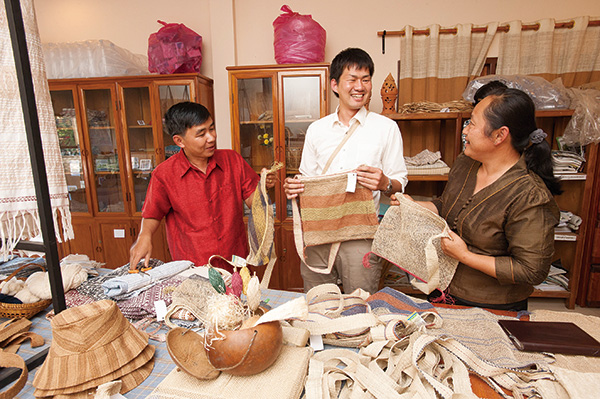
A Japan Overseas Cooperation Volunteer (community development), Mr. Takahisa Arai together with his counterparts Mr. Ounkham Onpachan (PMC Manager at the Development of industry and commerce, Oudomxay province) and Ms. Mayphone Silivong (Product Development Division Manager at the Development of industry and commerce, Oudomxay province). (Photo: Kenshiro Imamura / JICA)
Today, the international community is witnessing an expanding list of issues and risks associated with globalization, more complex development issues as developing countries diversify and multi-polarize, and the rise of emerging countries in development cooperation. Based on this recognition, the new Development Cooperation Charter approved by the Cabinet in February 2015 clarifies Japan’s policy to promote development cooperation in order to contribute more proactively to the peace, stability, and prosperity of the international community. The Charter states that such cooperation will lead to ensuring Japan’s national interests such as maintaining its peace and security, achieving further prosperity, realizing an international environment that provides stability, transparency and predictability, and maintaining and protecting an international order based on universal values.
This chapter presents the specific development cooperation efforts that Japan is making around the world. The term “development cooperation” refers to “international cooperation activities that are conducted by the government and its affiliated agencies for the main purpose of development in developing regions,” including ODA and other cooperation conducted in collaboration with public-private financing and activities.
Section 1 introduces thematically the efforts Japan is undertaking around the world, focusing on the following three development cooperation themes: “1. ‘Quality growth’ and poverty eradication through such growth”; “2. Sharing universal values and realizing a peaceful and secure society”; and “3. Building a sustainable and resilient international community through efforts to address global challenges.”
Section 2 presents specific examples by region as to how Japan is addressing the range of issues facing regions and countries in the world.
Finally, Section 3 introduces the measures for improving the effectiveness and efficiency of the government’s development cooperation structure, which is divided into the following four themes: “1. Implementation of effective and efficient development cooperation”; “2. Efforts for securing the appropriateness of development cooperation”; “3. Efforts for strengthening partnerships”; and “4. Efforts for strengthening the foundation of development cooperation implementation.”
Section 1 Measures for Each Priority Issue
This section introduces Japan’s recent efforts relating to the three priority issues of: “1. ‘Quality growth’ and poverty eradication through such growth”; “2. Sharing universal values and realizing a peaceful and secure society”; and “3. Building a sustainable and resilient international community through efforts to address global challenges.”
1. “Quality Growth” and Poverty Eradication through such Growth
Across the world, there is still a large number of people suffering from poverty. Eradicating poverty in the world is the most fundamental development challenge. In particular, it is important to provide both assistance from a humanitarian point of view for fragile states that have not been able to grasp the opportunities for development for different reasons, and assistance designed to set the development process in motion and overcome vulnerability. At the same time, in order to resolve the poverty issue in a sustainable manner, it is essential to achieve economic growth through self-reliant development of developing countries.
Such growth is not simply quantitative economic growth. It must be “quality growth” that is: “inclusive” in that the fruits of growth are shared within society as a whole, leaving no one behind; “sustainable” in that growth can be sustained in harmony with society and the environment; and “resilient” against economic crises, natural disasters and other shocks.
These are some of the challenges Japan tackled in its postwar history. Japan takes advantage of its own experience, expertise and technology as well as lessons learned in order to provide assistance to realize “quality growth” and poverty eradication through such growth.
1-1 Assistance Necessary to Secure the Foundations and the Driving Force for Economic Growth
(1) Development of Industrial Infrastructure and Industries, and Economic Policy
To achieve “quality growth,” it is important to improve the socio-economic infrastructure that serves as the foundation for the development of developing countries.
In addition, it is key that the private sector plays a central role. In particular, it is essential to boost private-sector activities, such as the development of industries and the expansion of trade and investment.
In developing countries beset by a variety of challenges, it can sometimes be difficult to develop capacities or set in place an environment for promoting trade and attracting private investment. Therefore, support from the international community is required.
< Japan’s Efforts >
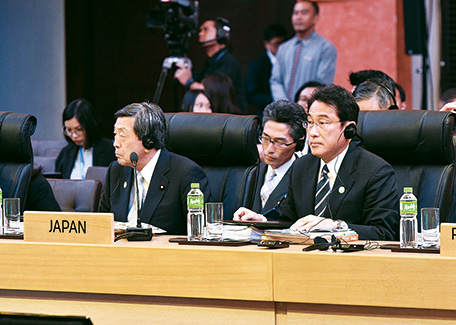
Foreign Minister Fumio Kishida vows to contribute to strengthening regional connectivity through efforts to promote “quality infrastructure,” at the Asia-Pacific Economic Cooperation (APEC) Ministerial Meeting held in November 2015.
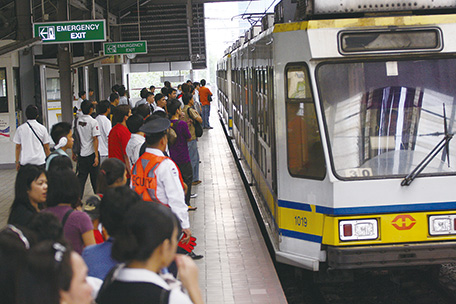
People waiting at the platform of Light Rail Transit (LRT) Line 1 in Metro Manila, the Philippines. Under the Capacity Enhancement of Mass Transit Systems in Metro Manila Project, for which an ODA Loan Agreement was signed in 2013, Japan will provide assistance for extending LRT Line 1 and LRT Line 2. (Photo: Harvey Tapan)
Japan develops quality infrastructure that leads to quality growth in developing countries and regions, in line with their economic and development strategies, and trains human resources to manage and operate this infrastructure. Japan’s strength lies in developing infrastructure that is truly useful for “quality growth” in developing countries, which includes technology transfers and employment creation in partner countries. Specific infrastructure development is carried out on roads, ports, airports, and information and communications technology (ICT). Such infrastructure contributes to the expansion of exchanges between urban and rural areas, ensures security in case of disasters, and promotes trade with and investment from overseas countries. Other important Japanese efforts that lead to “quality growth” in developing countries include the development of social infrastructure, which contributes to ensuring education, health, safe water, hygienic environment, and housing, as well as better access to hospitals and schools, together with the development of agricultural and fishery markets, and fishing ports to revitalize local economies. Additionally, Japanese public and private sectors collaborate to assist with the development of infrastructure systems that include engineering, construction, maintenance, and operation of infrastructure, along with the development of facilities and equipment. These initiatives also contribute to promoting infrastructure system exports.*
Demand for development in emerging countries, namely those in Asia, is still expected to be large, especially with regard to infrastructure development. In this regard, promoting quality infrastructure investment that utilizes Japan’s accumulated technology and experience will contribute to ensure that Japan will continue its growth together with developing countries. Furthermore, this will lead to expanding markets through development of partner countries, to forging international friendships, and to strengthening partnerships. (For more on “quality infrastructure investment,” see ODA Topics)
| Improving the Trade and Investment Climate
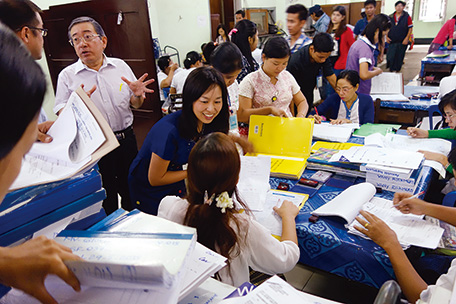
A JICA Expert, Ms. Asami Nakata provides instruction to customs officials at the Customs Department, Ministry of Finance of Myanmar as they handle a busy flow of import-export applications from customs clearing agents. (Photo: Hiroshi Yokoyama)
Japan utilizes ODA and Other Official Flows (OOF)* to support the advancement of small and medium-sized enterprises (SMEs), transfer of Japan’s industrial technology, and formulation of economic policies in developing countries. In addition, Japan supports the development of the trade and investment climate and economic infrastructures in order to enhance the export capabilities and competitiveness of developing countries.
The Doha Round Negotiations (the Doha Development Agenda)* of the World Trade Organization (WTO), which started in 2001, also emphasizes the promotion of development through participation in the multilateral free trading system by developing countries. Japan has contributed to the trust fund set up within the WTO with an aim to improve the capacity of developing countries to engage in trade negotiations and participate in the global market, thereby gaining the ability to implement the WTO agreements.
Regarding access to the Japanese market, Japan has implemented the Generalized System of Preferences (GSP),(Note 1) which applies lower tariff rates, in order to encourage imports of products from developing countries. Specifically, Japan provides duty-free quota-free access* for Least Developed Countries (LDCs)*. In addition, Japan also actively promotes Economic Partnership Agreements (EPAs),* and tries to create an environment for economic growth in developing countries through liberalization of trade and investment.
In recent years, active discussions regarding Aid for Trade (AfT)* have taken place at various international organizations, including the WTO and the OECD as a means of further promoting support by developed countries, including Japan. Japan provides funds for the development of transportation networks vital to trade, including ports, roads, and bridges, as well as for projects to construct power plants and power grids, etc. Japan has also provided technical cooperation in trade-related areas, including training of customs officials and intellectual property rights experts.
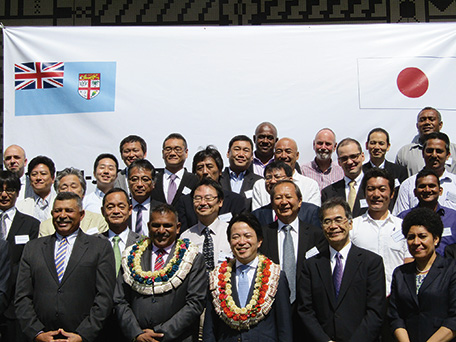
Parliamentary Vice-Minister for Foreign Affairs Masakazu Hamachi attends the Fiji-Japan Trade and Investment Seminar held in December 2015. At the seminar, the participants discussed the importance of promotion of trade and investment between Japan and the Pacific island nations confirmed at the Seventh Pacific Islands Leaders Meeting (PALM7).
Japan also provides assistance to small-scale production groups and small companies in developing countries for the One Village, One Product Campaign.* In addition, Japan supports developing countries in attracting private sector investment by identifying issues unique to those countries, and recommending measures to promote investment.
The Bali Package* achieved at the Ninth WTO Ministerial Conference in December 2013 incorporates trade facilitation. It is desirable that the Trade Facilitation Agreement* enters into force and is implemented at an early date. Japan has heretofore assisted developing countries with trade facilitation, and will continue to extend proactive support utilizing its knowledge and experience.
The theme of the Fifth WTO Global Review of Aid for Trade in July 2015 was “Reducing Trade Costs for Inclusive, Sustainable Growth.” Japan introduced examples of its development cooperation that encouraged trade facilitation, helped build international production and distribution networks, and contributed to the economic growth of developing countries and regions. These examples were appreciated by member states. Furthermore, as a case of technical cooperation of the Ministry of Economy, Trade and Industry (METI), Japan provides support for Japanese companies to expand their businesses abroad, including the fostering of industrial human resources, employment promotion, and securing of sophisticated local talent, through corporate culture courses, job fairs, and other means organized in collaboration with local universities and other actors.
| Assistance for Domestic Resource Mobilization
For developing countries to take ownership of their quality growth by resolving various development issues, it is critical that developing countries ensure tax revenue collection. This is known as “domestic resource mobilization.” Its importance has been noted at the discussion fora of the UN, OECD, G20, the International Monetary Fund (IMF), and Multilateral Development Banks (MDBs). This issue was also taken up in the 2030 Agenda for Sustainable Development, which was adopted at the UN Sustainable Development Summit in September 2015 and represents the new international development goals from 2016 through 2030.
Japan, together with the international organizations and other entities concerned, engages in discussions regarding domestic resource mobilization and provides relevant technical cooperation to developing countries. For example, Japan proactively provides technical cooperation to developing countries for improving their tax administration. In 2014, Japan dispatched National Tax Agency personnel as trainers on topics including taxpayer services, international taxation, and personnel training, to China, Indonesia, Malaysia, Viet Nam, Cambodia, among other countries. In addition, Japan hosts many officials from developing countries for training in Japan that includes lectures regarding Japan’s overall taxation system and tax administration.
As regards programs implemented with international organizations, Japan, for example, provides assistance for the OECD Global Relations Programme. This programme dispatches to developing countries OECD experts on the relevant fields to conduct seminars and lectures to deepen the countries’ understanding of taxation systems and tax enforcement, including tax treaties(Note 2) and investigation of the taxes of multinational enterprises. In addition, Japan provides cooperation on the human resource, expertise, and financing fronts for IMF’s technical assistance in the field of taxation. In February 2015, Japan co-hosted with ADB a seminar in Tokyo aimed at improving the legal and administrative frameworks and practices related to information exchanges for taxation purposes. Many practitioners from developing countries attended the seminar.
To ensure that developing countries collect taxes in their countries with certainty, it is critical that corporate transparency is enhanced and economic activities can be taxed appropriately in places where such activities are taking place. From this perspective, the outcomes of the OECD/G20 BEPS Project* compiled in October 2015 will be beneficial for strengthening domestic resource mobilization in developing countries.
| Finance
A sound and stable financial system, coupled with smooth financial and capital markets, form an essential foundation for the sustainable economic development of developing countries. As financial globalization advances, it is pivotal that financial systems in emerging countries are properly established and that assistance is provided for the development of sound financial markets.
In October and November 2014 and March 2015, the Financial Services Agency (FSA) invited officials in banking, security, and insurance regulatory authorities from developing countries in Asia. FSA officials and others conducted training regarding Japan’s regulatory and supervision systems, as well as programs for banking, securities, and insurance, respectively.
- *Infrastructure system exports
- Infrastructure system exports refer to the concept of not only exporting equipment for development of infrastructure such as electricity, railways, water, and roads overseas, but also exporting “systems,” which include engineering, construction, operation and maintenance of infrastructure.
At the Ministerial Meeting on Strategy relating to Infrastructure Export and Economic Cooperation, development cooperation efforts are coordinated among the relevant ministries and agencies; relevant organizations such as the Japan International Cooperation Agency (JICA), the Japan Bank for International Cooperation (JBIC), and the Nippon Export and Investment Insurance (NEXI); companies; and local governments. - *Other Official Flows (OOF)
- OOF refers to flows of funds to developing countries from the governments which are not considered to be ODA because the main purpose is not development. Examples include export credit, direct investment by governmental financial institutions, and financing of international organizations.
- *Doha Round Negotiations (the Doha Development Agenda)
- Doha Round Negotiations are negotiations between multiple WTO members aimed at liberalizing trade in a wide range of fields, including reduction/elimination of tariffs on industrial products and agriculture, forestry and fishery products, and deregulation in the service sector. One of their challenges is the development of developing countries through trade. At the Ninth WTO Ministerial Conference in December 2013, members agreed on such matters as the guidelines on rules of origin for promoting exports of least developed countries (LDCs) and the details of preferential treatment of services exports.
- *Least Developed Countries (LDCs)
- LDCs are countries classified by the United Nations to be particularly lagging in development even when compared to other developing countries, based on their income levels. LDCs meet certain criteria, including per capita gross national income (GNI) of $1,035 or less between 2011 and 2013. As of July 2015, there are 48 countries that have been so designated: 7 in Asia; 2 in the Middle East and North Africa; 34 in Sub-Saharan Africa; 1 in Latin America; and 4 in Oceania (see this).
- *Duty-free quota-free access
- Duty-free quota-free access means measures implemented by developed countries to eliminate customs duties, quotas, and other obstacles to imports of products from least developed countries (LDCs). Japan has expanded the number of applicable products, and approximately 98% of products exported by LDCs to Japan can be imported without payment of duties and without quotas (as of July 2015).
- *Economic Partnership Agreement (EPA)
- EPAs are comprehensive economic agreements with specific countries (or regions) that, in addition to free trade agreements (FTAs) that stipulate the liberalization of trade in goods and services such as the reduction/elimination of tariffs, include such areas as movement of people, investment, government procurement, and bilateral cooperation intended to enhance broad economic ties. These agreements are expected to further vitalize trade and investment between countries and contribute to economic growth.
- *Aid for Trade (AfT)
- AfT is assistance provided to developing countries to improve trade-related capabilities and to develop infrastructure, for the purpose of assisting developing countries in achieving economic growth through the multilateral trading system under the WTO.
- *One Village, One Product Campaign
- One Village, One Product Campaign is overseas utilization of an approach that began in Oita Prefecture, Japan, in 1979. The aim is to create jobs and revitalize the local community by developing unique local products through the utilization of local resources and traditional techniques. Efforts are made to focus on handicrafts, textiles, toys, and other attractive products that display the unique ethnic characteristics of developing countries in Asia and Africa, etc., and reach out to a wider range of people, thereby aiding in the expansion of exports of products from developing countries.
- *Bali Package
- The Bali Package is part of the Doha Round negotiations reached at the Ninth WTO Ministerial Conference in Bali in December 2013. The Doha Round negotiations, which started in 2001, have remained deadlocked due to clashes between emerging economies and developed countries, among other reasons. In order to achieve a breakthrough, new approaches have been explored, including the buildup of partial agreements. The Bali Package consists mainly of three fields: (i) Trade facilitation; (ii) Part of the field of agriculture; and (iii) Development. The Package decided to establish a work programme on the remaining issues of the Doha Round negotiations (e.g., agriculture, mining products, and services) by the end of 2014. (Subsequently, the deadline for establishing the work programme was extended to July 2015 at a special meeting of the WTO General Council.)
- *Trade Facilitation Agreement
- The Trade Facilitation Agreement provides for the simplification and enhanced transparency of customs procedures aimed at trade promotion. The protocol to make this agreement a part of the WTO Agreement was adopted at a special meeting of the WTO General Council in November 2014. It will enter into force after two-thirds of the member states (108 countries) have ratified it (as of November 4, 2015, 50 countries ratified the agreement). Japan completed the Diet approval procedures in May 2015. If this agreement is concluded, it will become the first multilateral agreement reached by all member states of WTO since its founding in 1995. According to preliminary estimates, the conclusion of the agreement is expected to increase GDP by $1 trillion annually.
- *OECD/G20 BEPS Project
- Base Erosion and Profit Shifting (BEPS) refers to the issue of multinational enterprises’ excessive tax reduction measures that exploit gaps and loopholes in international tax systems, including tax treaties, in order to intentionally lessen the tax burden for economic activities that should have been taxed. To address this issue, the OECD’s Committee on Fiscal Affairs chaired by Japan launched the BEPS project in June 2012. The BEPS Action Plan was presented in July 2013, and following two years of discussions, the BEPS Final Reports were released in October 2015. As the project enters its implementation phase (“post-BEPS”), Japan will lead the discussions in cooperation with the OECD, developing countries, and relevant international organizations to ensure that the outcomes of the BEPS project are adhered to by the broader international community.
- Note 1: This system applies tariff rates lower than the MFN rates (preferential tariff rates) to designated agricultural and fishery products and industrial products imported from developing countries, in order to increase export income and promote industrialization and economic development in developing countries.
- Note 2: Bilateral treaties for avoiding the double taxation of and preventing the evasion of taxes on income.
Côte d’Ivoire
Project of the Development of Urban Master Plan in Greater Abidjan
Technical Cooperation Project (February 2013 – Ongoing)
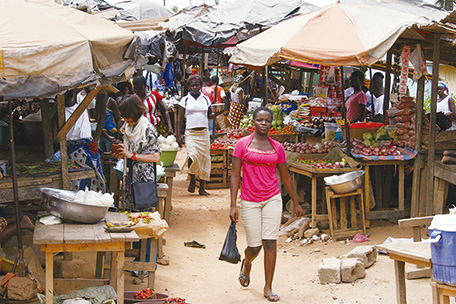
A market in the Aleppe District of Abidjan City. (Photo: JICA)
Situated in West Africa, Côte d’Ivoire’s de facto capital of Abidjan and the surrounding vicinity (Greater Abidjan) have seen an influx of some 3 million refugees and internally displaced persons due to coups and domestic disturbances that have continued for close to 20 years since the 1990s.
As a result, the population of Greater Abidjan has increased sharply to upwards of about 7 million people, and its urban area has sprawled from 500 to 750 square kilometers, forming poor districts in a disorderly way.
Abidjan originally had created an urban plan envisioning a population of around 3.5 million people in 2000. However, domestic disturbances have since caused a population expansion, and the failure of social capital and urban management functions, resulting in a major gap between the plan and the reality. The city has also faced a serious shortage of basic social infrastructure, including schools, healthcare facilities, roads, and the water and sewer system.
At the request of the Government of Côte d’Ivoire, the Government of Japan dispatched a survey team to analyze and assess the urban plan created in 2000, and to help formulate a new, more appropriate urban development plan leading up to 2030 based on the lessons learned.
Japan investigated the feasibility of this new urban plan and drew up a master plan focusing on land use, urban transport development, and arterial road construction for future urban development in Greater Abidjan.
Based on the master plan that Japan proposed, the Government of Côte d’Ivoire then established its Abidjan Urban Development Plan. Under this plan, Abidjan aims to improve urban transport function through the development of an arterial road network, mass transit system and other measures.
In Greater Abidjan, where a specific future vision of the urban plan was set out in cooperation with Japan, the Project for the Improvement of the Japan-Ivorian Friendship Intersection was launched as the first step towards making it a reality. Achievement of sustainable urban development is expected in a manner consistent with Côte d’Ivoire’s national development policy. (As of August 2015)
